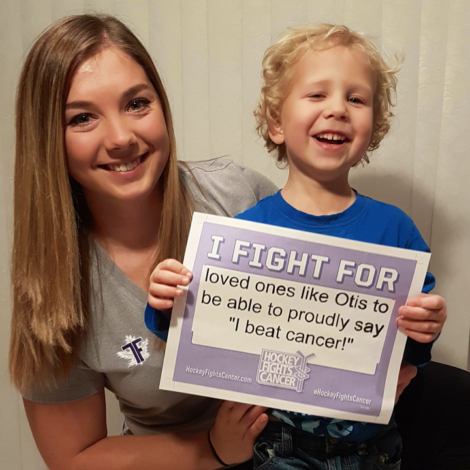The faint scent of stale hockey equipment emanates from Danielle Gagne’s bag. It’s an aroma that, while generally unpleasant, can trigger memories of past victories and dressing rooms. Gagne admits the smell could be far worse, alluding to her swollen left ankle visible above her low-top sneaker.
“I wish I would’ve hurt it doing something cool, it was the stupidest thing, we were doing a warmup for CrossFit, we were doing hurdles, and I was clearing them all no problem,” she says. “I didn’t jump as hard, and it was just that stupid thing that my toe clipped it, it landed, and I landed and I immediately felt like I was going to throw up because it hurt so bad.”
“I’m tough, I don’t cry,” she adds.
In mid-November, the Toronto Furies boasted a .500 record ahead of their two-week trip to China. The 2017–2018 Canadian Women’s Hockey League (CWHL) season marks the first time in the league’s history that players will be paid, a step forward made possible by an influx of cash from new sponsorships and the league’s new Chinese teams, the Kunlun Red Star and Vanke Rays. Still, the salaries — ranging from $2,000–$10,000 — don’t provide a livable wage. As a result, Gagne works full-time at a software company in her hometown of Bolton, Ontario.
In her second season with the Furies, Gagne has steadily grown into her role, developing a brand of confidence that only comes from hard work and overcoming adversity. Her first CWHL career goal came in a 4–2 loss to the Boston Blades. “I still can’t believe it took me that long to score, but I’m glad I finally broke down that mental block in my head,” she says.
Congrats to @danigagnee Danielle Gagne on her first ever CWHL goal. Many more to come! pic.twitter.com/GtlWQjR7VA
— Toronto Furies (@TorontoCWHL) January 7, 2018
The journey that changed her life
Despite hockey’s place at Gagne’s core, it’s not everything in her life. She defines the 4K for Cancer bike ride across America she endured in 2015 as the most important moment of her life. Gagne began the ride with the intention of honouring her late grandfathers, who both died of cancer. That all changed eight months from the start of her trek, when she learned her then-three-year-old cousin Otis Spencer had been diagnosed with brain cancer.
“My cousin Alex, they have three kids… and ended up having [another child] Darius when Otis was in the hospital going through chemo,” she says. “It’s always nice to celebrate him because he’s an amazing kid and my inspiration.”
The daunting ride presented Gagne with a daily opportunity to triumph over adversity. The Baltimore to San Francisco route saw her bike up and over the Rocky Mountains and sleep on an air mattress on various church floors in Nebraska. She even got lost for eight hours in the Oregon desert.
“We were so dehydrated, I felt drunk for the next two days and I got so sick, but that was the worst part. Everything else was awesome,” she adds.
“Everything we ate for the whole trip was based on donations, so we’d go to restaurants and asked if they’d give us food,” she says. “Utah was beautiful… I remember the biggest incline was 15 per cent, and you’d have to keep moving because you’d fall over.”

PHOTO COURTESY OF DANIELLE GAGNE
“The day that my bike ride ended, [Otis] was said to be clear as of that day, which was the weirdest coincidence ever,” she says. “I just started bawling my eyes out.”

PHOTO COURTESY OF DANIELLE GAGNE
Teammates that inspire
Each CWHL franchise has felt the effects of Hockey Canada’s Olympic centralization ahead of the 2018 Winter Games in PyeongChang. Natalie Spooner, Erin Ambrose, and Renata Fast are all absent from the Furies. A combination of factors contribute to the Furies’ 11-game winless streak, but it mostly stems from their inability to score — the team is second from last in the league in goals scored.
Toronto has also struggled to find the back of the net in the absence of Spooner, the team’s leading goal-scorer with 13 in the 2016–2017 season. Alongside Olympic captain Marie Philip-Poulin and fellow alternate captain Brianne Jenner, Spooner serves as one of the faces of women’s hockey in Canada. This time of year, Spooner’s image can be found on cereal boxes as Canada’s women’s hockey team is poised to earn its fifth consecutive Olympic gold next month.
Spooner’s talent and leadership isn’t new to Gagne, who played alongside her during her freshman year at Ohio State. “She’s just unbelievable,” recalls Gagne. “I remember being at U18 tryouts for Team Canada and she was U22 at the time, and she had the highest score for strength and one of the highest scores for cardio. That’s unheard of.”
The college experience
The warmth in Gagne’s voice increases as she reflects on the people she’s played with during her collegiate career. “God, she’s so fast,” she whispers, referring to the speed of Amanda Kessel, the former Minnesota Golden Gophers star who routinely terrorized Ohio State.
The only time Gagne defeated Minnesota was via a nine-round shootout in early 2014, a miraculous result that upset a high-ranking program. The win earned her team a shoutout from ESPN’s SportsCenter anchor John Buccigross and a place on the network’s top 10 college plays of the week.
The Buckeyes celebrated with ice cream and milkshakes at Annie’s Parlour in Dinkytown, while Kessel — absent from the Minnesota roster — was training with the US national team ahead of the Sochi Olympics.
Congrats to women of Ohio State who beat #1 Minnesota in a shootout them ate oatmeal in a cup. Or something. pic.twitter.com/rIVolNDHVB
— Bucci Mane (@Buccigross) January 13, 2014
“We were pumped, I don’t think we got undressed for about 45 minutes we were just running around the dressing room,” she laughs. “Minnesota was always the worst because you always thought, ‘Yeah we’re ready,’ and they’d just come and kick your ass so bad.”
Gagne says that every game against the University of North Dakota (UND) was competitive, mentioning in particular her experience battling against the Lamoureux twins.
“One time I went for a Hail Mary breakaway pass, [one of the twins] caught it and tried to bring it down, and I should’ve gotten a penalty for this, but I two-handed her in the arm and the puck went through her legs, and I picked it up went on a breakaway and scored, so that was unreal.”
She questions UND’s decision to cut its women’s hockey program last March, a program that developed a wave of Olympians, including the Lamoureux twins, who contributed to its initial stardom both transferring to UND in 2010 and after their freshman season at Minnesota.
“Again that goes toward helping women’s hockey grow, just kidding, we don’t want you at our school anymore,” adds Gagne. “[UND] women’s hockey is top five in the nation every year but they had to cut it… But the men’s program is still there.”
Gagne couldn’t imagine a life without hockey. She admits she cried when she visited Ohio State’s campus in early November, overwhelmed by the incredible memories she made over her four years in Columbus.


